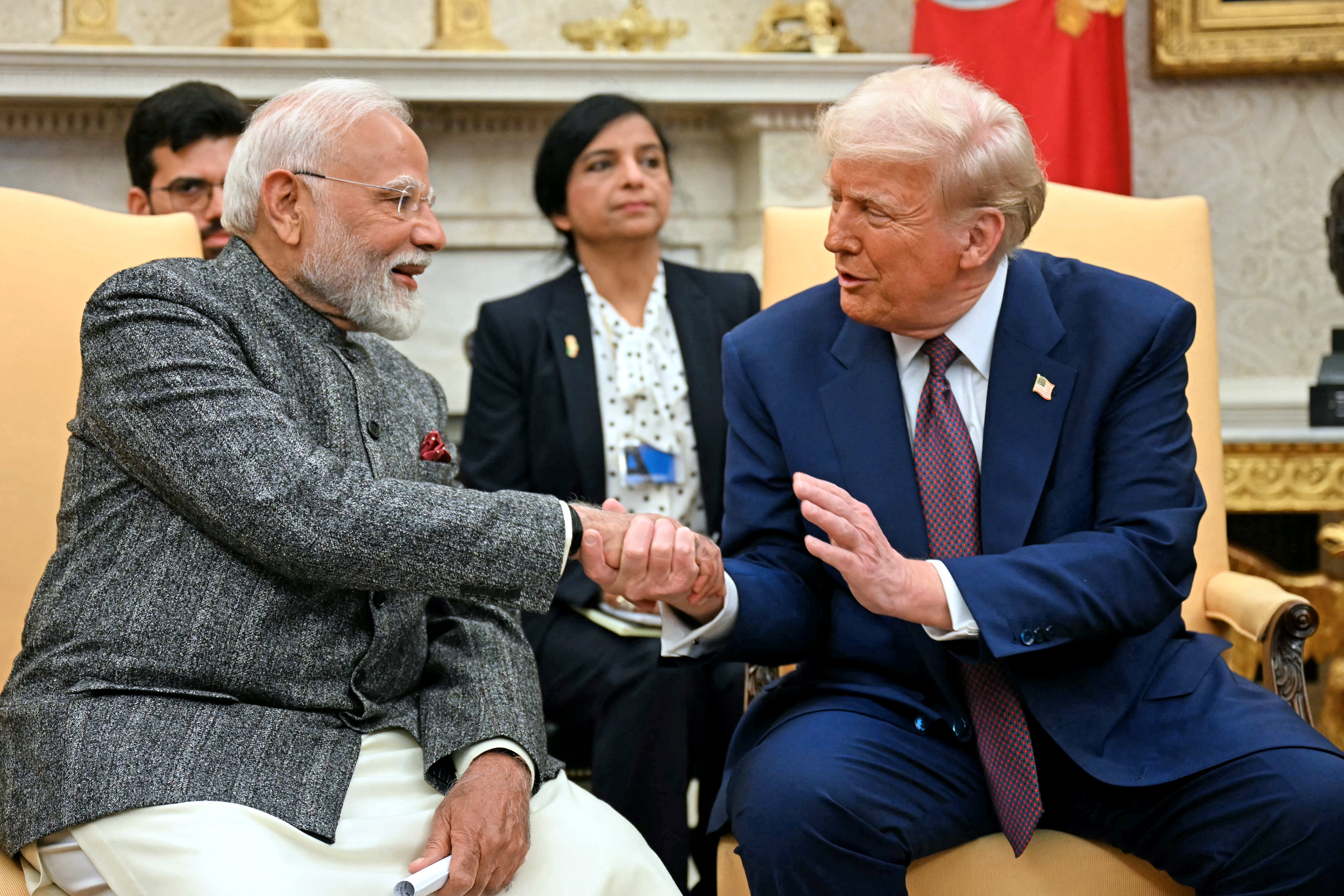India to take steps to ‘secure national interest’ after Trump imposes 25% tariff

The Indian government said it would take necessary steps to secure its national interest after Donald Trump hit the South Asian country with a 25 per cent import tariff in a stinging rebuke that also targeted New Delhi for its ties to Russia.
The Narendra Modi government said it was evaluating the implications of the American president’s decision – announced just ahead of the 1 August deadline for his new tariff regime to take effect – while continuing to carry out “negotiations on concluding a fair, balanced and mutually beneficial bilateral trade agreement”.
New Delhi had been negotiating a trade deal with Washington for months before Mr Trump announced the levy. The talks were set to resume next month and Indian officials expected a deal to be reached by September or October.
In a social media post announcing the new tariff, Mr Trump accused India of enforcing the “most strenuous and obnoxious” regulatory hurdles of any country. He said he was imposing a 25 per cent levy on Indian exports to the US and an undefined penalty for New Delhi’s energy and military purchases from Russia.
“While India is our friend, we have, over the years, done relatively little business with them because their Tariffs are far too high, among the highest in the World, and they have the most strenuous and obnoxious non-monetary Trade Barriers of any Country,” Mr Trump posted on his Truth Social platform.
“Also, they have always bought a vast majority of their military equipment from Russia, and are Russia’s largest buyer of ENERGY, along with China, at a time when everyone wants Russia to STOP THE KILLING IN UKRAINE — ALL THINGS NOT GOOD!”
The US has a trade deficit of $45.7bn with India.

Just a few hours later, Mr Trump again took aim at India for its ties with Russia. “I don’t care what India does with Russia,” he posted on Thursday.
“They can take their dead economies down together, for all I care. We have done very little business with India, their Tariffs are too high, among the highest in the World.”
Mr Trump’s aggressive rhetoric crushed India’s hopes of getting preferential treatment compared to other Asian economies on the back of his bonhomie with Mr Modi.
The 25 per cent rate is harsher than what other major Asian economies like South Korea, Japan and Indonesia have secured from the US. While both South Korea and Japan have agreed to a 15 per cent rate, Indonesia has settled for 19 per cent.
“The government has taken note of a statement by the US president on bilateral trade,” the Indian government said. “The government is studying its implications.”
Mr Trump had earlier announced a trade agreement with Pakistan which India’s chief rival said would lead to lower tariffs on its exports. Neither side has yet revealed the agreed tariff rate, however.
Mr Trump’s latest comments threaten to strain Washington’s relationship with New Delhi, which is already unhappy with the US president’s closeness with Islamabad.
Addressing the parliament on Thursday, commerce and trade minister Piyush Goyal said New Delhi was no more a “fragile economy” and was, in fact, on track to become the third largest economy in the world.
“India and the US entered negotiations for a fair, balanced and mutually beneficial bilateral trade agreement in March 2025, with a target to complete the first draft of the agreement by fall of 2025,” he said. “The government is examining the impact of the recent events. The ministry of commerce and industry is holding talks with exporters, industries and all stakeholders and gathering information on their assessment of this issue.”
Mr Goyal emphasised the government was committed to safeguarding the welfare of the country’s farmers and labourers.
In the five rounds of talks held so far, agriculture and dairy remained a major sticking point as the US sought greater access to the Indian market for its farm exports like wheat, corn, cotton, and genetically modified crops.
India, however, insisted that the agriculture and dairy sector were off-limits. The sector employs over 80 million people in the country who will be prepared to take to the streets in protest if a deal is perceived to be detrimental to their interests.
Mr Goyal told CNBC last week that agriculture was a sensitive sector for India and assured that the Modi government would ensure the interests of farmers were “well protected.”
However, he said India remained “optimistic” about striking a deal with Washington soon.
The US was India’s top trading partner until recently, with bilateral trade totalling $190bn in 2024. Mr Trump and Mr Modi have set an ambitious goal to more than double that figure to $500bn.
